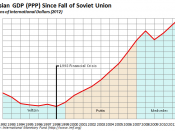Political Background
The separation of powers which existed under the Soviet constitution was essentially a myth. A Russian accurately characterized the relationships that existed between party, state and society as, ...The state absorbed the society, the Party absorbed the state, and the Party appartchiks, the nomenclature under the totalitarian leadership of the Secretary-General absorbed the Party." Both legislative and judicial branches served as rubber stamps" to the Presidium of the Supreme Soviet which unlike the Supreme Soviet itself was constantly in session. The development of political reform in the late 1980s weakened the party's control over the reigns of power. The devolution of power from the Presidium occurred through the creation of the office of the President which received the executive powers while the legislative powers were assigned to Congress of Peoples Deputies. The judicial branch also achieved higher visibility during the late Soviet period through the creation of the Committee on Constitutional Supervision.
The Soviet Union's collapse in 1992 introduced radical changes into all aspects of Russian society. Russia has little experience with democracy in any form. Without a strong democratic tradition, it should not be unexpected that instability would develop in all aspects of Russian life. The role of governmental finance in post-Soviet society is no exception. Competing explanations exist for Russia's travails but a shared trait of many them is the distribution of power at the federal level and the relationship between the federal and sub-national levels of government.
Political problems did not take long to develop in the Russian Federation after the USSR's dissolution. At the federal level, the creation of the present constitution is one cause of the instability which plagues Russia today. After winning a national referendum on August 15, 1993 in which the electorate was asked to endorse the Yeltsin's reform policy,


